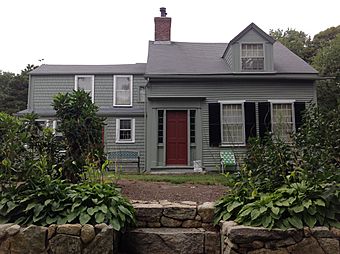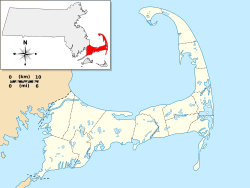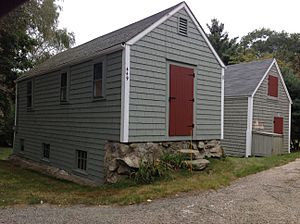Adams-Crocker-Fish House facts for kids
Quick facts for kids |
|
|
Adams-Crocker-Fish House
|
|
 |
|
| Location | 449 Willow St., Barnstable, Massachusetts |
|---|---|
| Built | 1830 |
| Architectural style | Greek Revival |
| MPS | Barnstable MRA |
| NRHP reference No. | 87000219 |
| Added to NRHP | March 13, 1987 |
The Adams-Crocker-Fish House is an old and special house in Barnstable, Massachusetts. It was built around 1830. This house is a rare example of a small farm home from that time. It even has some of its original farm buildings. The property was added to the National Register of Historic Places in 1987. This means it's an important historical site.
About the Adams-Crocker-Fish House
The Adams-Crocker-Fish House is located in a quiet, mostly residential area of Barnstable. It sits on the west side of Willow Street. The property includes the main house and two smaller buildings. These smaller buildings were once part of the farm.
The House's Unique Look
The main house is a "half-Cape" style cottage. This means it has one and a half stories. It is three bays wide, which means it has three main sections across the front. The roof is gabled, sloping down on two sides. The outside is covered with wooden clapboard and shingle siding.
A newer, two-story section extends from the left side of the house. Another section sticks out from the back. The main front door is on the left side of the house. It has a special design called Greek Revival. This design includes tall, flat columns called pilasters. It also has small side windows next to the door. Above the door is a decorative frame called an entablature.
A House with a History
The cottage was built before 1830 by a man named Obadiah Adams. People who have lived in the area for a long time say the house was originally in a different spot. It was once where the Mid-Cape Highway is now.
In 1831, John Blossom bought the Adams estate. He moved the house to its current location. The very next year, he sold the property to Lemuel Crocker. Later, in 1856, Crocker's widow sold it to Isaac Fish. The house stayed in the Fish family until 1903. Since then, many different people have owned it.
This house is important for two main reasons. First, the original "half-Cape" style is very well preserved. Second, it still has its old farm buildings. These buildings help us understand what small farms were like long ago.





